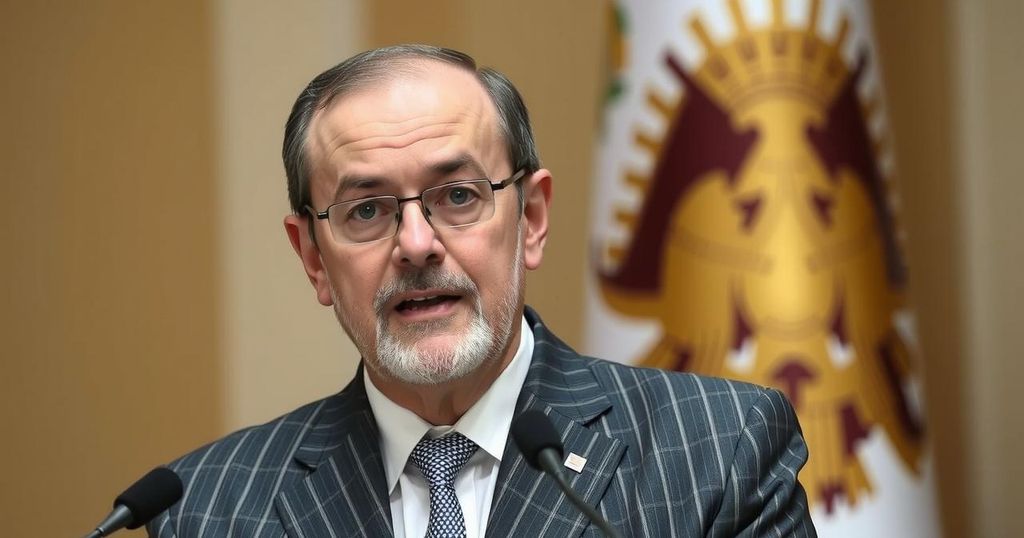Syria’s new leader, Abu Mohammad al-Julani, urges Iran to reconsider its regional involvement, emphasizing hopes for a positive role. He discussed potential elections within four years and the significance of unifying the country. Engaging with Western diplomats and managing internal tensions, he intersects diplomacy with calls for national dialogue, inclusion, and recognition of diverse societal groups. Al-Julani also highlights the importance of relations with Saudi Arabia and Russia in shaping Syria’s future.
In a recent interview with Al-Arabiya/Al-Hadath, Syria’s new leader, Abu Mohammad al-Julani, formerly known as Ahmed al-Shara’a, expressed a desire for Iran to reassess its interventions in the region. He articulated that a significant segment of the Syrian population hopes for a constructive Iranian role. Regarding military engagements, he stated that the Military Operations Department fulfilled its responsibilities against Iranian positions amidst escalating tensions. Al-Julani anticipated forthcoming positive statements from Tehran and underscored the possibility of future elections, which might take up to four years to prepare for. He believes that a transition in leadership from the Assad regime to new governance could foster stability across the Middle East.
With an agenda of garnering support, al-Julani has engaged in discussions with Western diplomats and regional leaders, particularly following recent sectarian strife and protests in several Syrian cities. Managing these tensions has required a combination of diplomatic flexibility and security force deployment. Notably, some Syrian military personnel who had fled post-Assad regime collapse are now returning, prompting inquiries about the treatment of former dissenters.
Al-Julani remarked, “I do not consider myself the liberator of Syria. Everyone who made sacrifices liberated the country,” illustrating a somewhat modest self-perception amid significant political change. Furthermore, he affirmed the intent to ensure peaceful governance transitions to maintain regional security for decades. His interviews have varied in focus based on interlocutors, adjusting language to align with Saudi Arabia and Gulf constituents, distinct from those aimed at Turkish or Qatari audiences.
Discussion about the future constitution of Syria indicates that writing it could take three years, with elections possibly occurring in four years. Al-Julani emphasized the necessity of a comprehensive population census for valid elections and advocated for a National Dialogue Conference involving all societal factions. Given that parts of Syria remain outside government control, efforts to unify the country under Damascus’ governance will likely be gradual. He stated, “Syria will need a year for the citizen to feel radical service changes.”
In regard to inclusivity, the new leadership aims to ensure rights to protest and expressed intentions to avoid excluding any societal group, despite current appointments deriving predominantly from a single political faction. Al-Julani acknowledged the divisions left by the previous regime and outlined ambitions for disbanding various armed groups through national dialogue, stressing the importance of integrating groups like the Syrian Democratic Forces into national military frameworks.
Al-Julani articulated optimism concerning potential sanctions relief from the upcoming US administration under President Trump, recognizing the substantial role of Saudi Arabia in Syrian affairs. He conveyed pride in Saudi contributions and hinted at potential investment avenues, recalling his upbringing in Saudi Arabia until the age of seven. Lastly, he acknowledged the significance of Russia in Syria’s geopolitical context, noting favorable statements from Russian officials regarding the transitional governing authority, a vital recognition of the longstanding Russian support for Syria and its military infrastructure.
The context of this analysis revolves around the leadership transition in Syria following the fall of the Assad regime. Abu Mohammad al-Julani’s ascension represents a significant shift in the geopolitical landscape of the region. His communications with Iran, the aspirations for a reformed governance structure, and the handling of internal dissent reflect the complicated dynamics of Syrian society, which remains fragmented due to years of conflict. Furthermore, his interactions with external powers, particularly Russia and Saudi Arabia, highlight Syria’s delicate balance of international relations as it seeks to stabilize post-conflict.
In conclusion, Abu Mohammad al-Julani’s leadership marks a pivotal phase for Syria as it navigates the aftermath of years of turmoil. His call for Iran’s re-evaluation of its regional roles aligns with a broader vision for a stable Syria, embracing inclusivity and reform. As he pursues diplomatic engagements to unify a divided nation, the transition to a new government structure, inclusive of various societal elements, remains critical. The outcomes of these efforts will significantly determine Syria’s direction in the coming years.
Original Source: www.jpost.com






